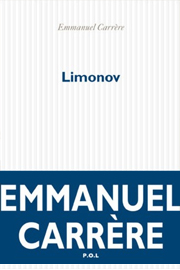Book review: Liminov: A Novel by Emmanuel Carrère
This is an extraordinary, fantastic book about an extraordinary, fantastic life. It’s billed as a novel, can be read as a novel and would be a good novel if Eduard Limonov had never existed.
But he did and still does, and this is his story assembled and related by Emmanuel Carrère, French novelist and film-maker, a bourgeois who, as he says, lives «in a calm country on the decline where social mobility is limited».
How then to approach the life of a man who has been a juvenile delinquent hooligan, an avant-garde poet in Moscow in the Brehznev years, a bum and then a rich man’s butler in New York, an admired and scandalous novelist in Paris, a partisan of the Serbs in the Bosnian war, one of the founders of the National Bolshevik Party in post- Soviet Russia; who campaigned alongside the chess grandmaster Gary Kasparov in a presidential election, who has served time in Vladimir Putin’s new gulag, and who is still going with his small army of devoted followers; a man who has been married four times and has had an intensive sex-life, both straight and gay, who is charismatic, and charming when he chooses and yet expresses ideas which liberal democrats like the author find mostly repellent?
Carrère’s answer is: you write it as a non-fiction novel, in which everything is true in one sense, and speculative, open to dissent, in another. You intrude yourself when you feel like it, with your own memories of the man and your conversations with him. In doing so, you find yourself offering also a history of Russia over the 70 years of your hero’s life.
Carrère is well-equipped to do this. His mother, from a White Russian family, was a distinguished historian of the Soviet Union — one of the earliest to predict its disintegration — and her own father was a collaborator with the Nazis during the years of the German Occupation of France who disappeared in mysterious circumstances, probably murdered in 1944. So, though he speaks of himself as a comfortable bourgeois who chose to do his National Service in the French Peace Corps rather than the army, and though he is sometimes horrified by Limonov and sometimes afraid of him, he can also see him as a heroic figure who has experienced in reality what he himself has only imagined.
They have something else in common, something which appeals to me too. Both as boys adored the novels of Alexandre Dumas, and Carrère sees a resemblance between Limonov in his old age and the wise and weary d’Artagnan of Le Vicomte de Bragelonne whom Robert Louis Stevenson loved and admired.
The book takes its epigraph from Vladimir Putin: «Whoever wants the Soviet Union back has no brain. Whoever doesn’t miss it has no heart». This is Limonov’s position too, and it is complicated. The Soviet Union gave him little. Though his father was a very junior officer in the KGB, he grew up in poverty with few prospects, lived as a hoodlum and was happy to take the chance to emigrate to the USA. Yet he admired, even revered, Stalin, and despised the dissidents. (He called Solzhenitsyn «an old fart».) He has always been full of class resentment, identifying himself with the outcast — though he also despises the compliant, unrebellious poor.
Intellectually, as Carrère shows, he is a mess, emotionally too indeed, and yet he is also, very evidently, a complete and self-assured man. Is he a fascist? Yes, certainly, but also perhaps not. How, Carrère asks , do we «deal with the evident fact that life is unjust and people are unequal? … Nietzsche, Limonov and this extreme moral voice within us that I’m calling fascist say with one voice, «That’s reality, that’s the world as it is»».
This, doubtless, is Putin’s position too, and Putin and Limonov have much in common — which is why Limonov now campaigns against him. «Like Eduard», Carrère writes, Putin is «cold and cunning; he knows that men are wolves; he only believes in the right of the strongest and that values are relative; he prefers to make people afraid rather than be afraid himself ….The difference between him and Eduard is that he succeeded. He’s the boss. «Eduard Limonov has never been that, except in a small way, lording it over a gang of unhappy youngsters who adore him and follow him till the day comes when they die or drop even further out or some of them decide to stop being outsiders and make a career for themselves. So ultimately Limonov in his public life is a failure, even as a fascist, a literary man whose political engagement has been futile. If he had ever had power, I suspect he wouldn’t have known what to do with it».
Perhaps failure is what redeems Limonov, makes him interesting anyway. Carrère’s son, Gabriel, suggests that Limonov is ending like Jake La Motta in Scorsese’s Raging Bull, beaten-up, washed-up, shadow-boxing and muttering: «I’m the boss, I’m the boss. I’m the boss». Yes, Carrère thinks: «It’s pathetic, it’s magnificent». It’s certainly one way of looking at Limonov, and it may be the right one. He would be intolerable, if he had come out on top, and in doing so, might have learned nothing about himself.
I can’t make up my mind. Carrère can’t either. That’s one of the beauties of this entrancing book. It leaves you in a state of uncertainty. But read it and you will learn an awful lot about Russia now and in the days of the Soviets.
«The Scotsman», 25 october 2014
 copyleft 2012–2020
copyleft 2012–2020